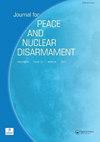Mission Unaccounted: Japan’s Shift of Role in US Extended Nuclear Deterrence
IF 1.4
Q4 INTERNATIONAL RELATIONS
引用次数: 0
Abstract
ABSTRACT Japan’s security policy appears to be undergoing a qualitative change. Policymakers, however, have not provided sufficient explanation to the nation regarding such a shift. What is the qualitative change in Japan’s security policy premised on US extended nuclear deterrence? To answer this question, this article first analyzes changes both in Japanese policymakers’ understanding of US extended nuclear deterrence and the concept of nuclear deterrence, and the shift of Japan’s defense policies. Next, a comparison of deliberations in the National Diet of Japan during the Cold War and after the Cold War, and Japan’s defense policies during the Cold War and after the Cold War, respectively, reveals that while policymakers’ understanding of US extended nuclear deterrence and the concept of nuclear deterrence have not really changed, the security challenges surrounding Japan have shifted in focus from deterrence to response in the recognition of policymakers. With that, Japan’s policy premised on US extended nuclear deterrence has shifted from the stage of mere reliance to the stage of engagement with the United States. This is the qualitative change in Japan’s security policy premised on US extended nuclear deterrence. The implication of the shift is that the use of nuclear weapons itself is a potential policy issue, yet it remains unexamined. The final section points out that Japan’s engagement with the United States in extended nuclear deterrence advances the move toward solidification of US extended nuclear deterrence for Japan. It also discusses Japan’s security challenges associated with the ongoing solidification.未计数的任务:日本在美国扩大核威慑中的角色转变
摘要:日本的安全政策似乎正在发生质的变化。然而,政策制定者并没有就这种转变向全国提供足够的解释。以美国扩大核威慑为前提的日本安全政策的质的变化是什么?为了回答这个问题,本文首先分析了日本决策者对美国扩展核威慑和核威慑概念的理解的变化,以及日本国防政策的转变。接下来,比较日本国民议会在冷战期间和冷战后的审议情况,以及日本在冷战期间、冷战后的国防政策,可以发现,尽管政策制定者对美国扩展核威慑和核威慑概念的理解并没有真正改变,在政策制定者的认可下,围绕日本的安全挑战已从威慑转向应对。据此,日本以美国扩大核威慑为前提的政策已从单纯依赖阶段转变为与美国接触的阶段。这是以美国扩大核威慑为前提的日本安全政策的质的变化。这一转变的含义是,使用核武器本身就是一个潜在的政策问题,但尚未得到审查。最后一节指出,日本与美国在扩展核威慑方面的接触推动了美国对日本扩展核威慑的固化。它还讨论了与正在进行的固化有关的日本的安全挑战。
本文章由计算机程序翻译,如有差异,请以英文原文为准。
求助全文
约1分钟内获得全文
求助全文
来源期刊

Journal for Peace and Nuclear Disarmament
INTERNATIONAL RELATIONS-
CiteScore
1.30
自引率
0.00%
发文量
36
审稿时长
12 weeks
 求助内容:
求助内容: 应助结果提醒方式:
应助结果提醒方式:


